Fifteen years ago this month, President George W. Bush announced he was issuing a moratorium on the future spending of federal funds for embryonic stem cell research. He would later refer to this as one of the most consequential “Decision Points” (the title of his autobiography) of his presidency.
While his presidential legacy is much debated, science has already vindicated his decision to end the destruction of embryos and to pursue alternative methods of medical advancement.
A brief science backgrounder: Despite public confusion, stem cells are not embryos; they are the types of cells that can differentiate into one or more of the types of cells of an organism’s body. Because of this, medical researchers have long been eager to use stem cells to allow healthy new cells to replace or repair damaged tissues and as a result, offer great promise for individuals suffering from cardiovascular diseases, diabetes, Parkinson’s disease, spinal cord injuries, and a range of other conditions.
The debate over stem cells concerns the derivation of them, namely whether or not they require the destruction of human embryos or if they come from elsewhere (such as adult stem cells) and to what extent they may or may not be used for the purposes of regenerative medicine.
While critics of Bush’s policy were eager to label him as “anti-science,” tone deaf, and unsympathetic to folks like Christopher Reeve (who they claimed would be able to walk again with the aid of embryonic stem cells), other prominent figures, including leading scientists and ethicists, urged both caution in the destruction of life in its earliest stages and also pushed for other means to be pursued that they believed could be just as effective.
That’s why when Bush made his decision, he also announced that he was doubling federal funding for research to explore alternative methods—and in November 2007, James A. Thomson (along with Shinya Yamanaka), the same scientist to first isolate human embryonic stem cells which sparked this whole debate, announced that he discovered an “embryo-free way to produce genetically matched stem cells.”
Writing in the Washington Post at the time, Dr. Charles Krauthammer, a handicapped doctor (who arguably had the most to gain from any advances from embryonic stem cell therapy) and a one time critic of Bush’s policy, proclaimed: “The verdict is clear: rarely has a president—so vilified for a moral stance—been so thoroughly vindicated.”
Since that time, adult stem cells have been used to grow a beating heart, cure cataracts and reverse blindness, and to treat numerous cancer patients and support individuals with autoimmune diseases. To date, over 1.5 million people have been treated using adult stem cell therapy.
But as Krauthammer also noted, Bush wasn’t vindicated simply for pushing for scientific alternatives, but for his willingness to take a moral stand. “What Bush got right was to insist, in the face of enormous popular and scientific opposition, on drawing a line at all, on requiring that scientific imperative be balanced by moral considerations,” he concluded.
Reflecting back on the great stem cell debate, we should pause and consider the fact that too often we move full speed ahead because we can do certain things, before ever asking whether we should be doing them in the first place.
Be it the creation of children intentionally severed from their parents via anonymous egg and sperm donation, the growing industry of surrogacy where women are reduced to their wombs and motherhood is turned into a market, or the efforts to use the powers of medicine to kill those who are greatly suffering, debates over these pressing issues in the field of bioethics strike at the heart of what it means to be human.
As Bush did in 2001, he didn’t settle for a lowest common denominator public policy approach, but instead, asked the nation to think fundamentally about the question—and mystery—of human life, even in its nascent stages.
In his willingness to give pause and to probe the intricacies of this debate, President Bush reminded us that something deeper is at stake beyond stem cells: our very souls. Our national leaders would do well to ask these hard questions more often and to make us do the same.

















